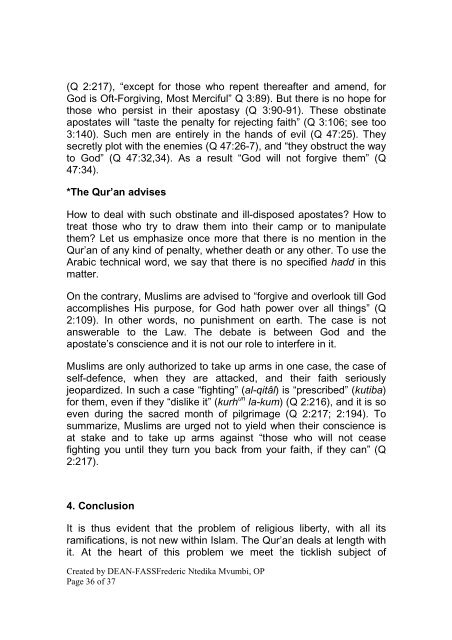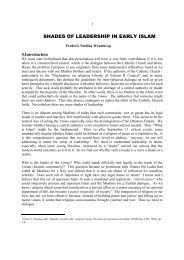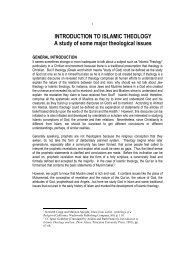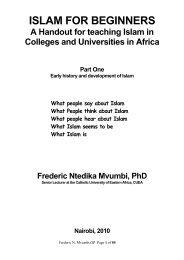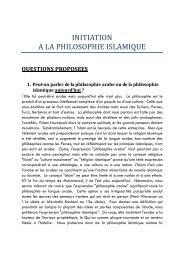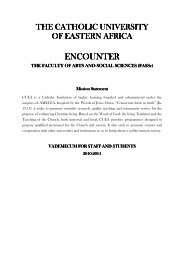PRINCIPLES FOR INTERRELIGIOUS DIALOGUE.pdf - CUEA
PRINCIPLES FOR INTERRELIGIOUS DIALOGUE.pdf - CUEA
PRINCIPLES FOR INTERRELIGIOUS DIALOGUE.pdf - CUEA
You also want an ePaper? Increase the reach of your titles
YUMPU automatically turns print PDFs into web optimized ePapers that Google loves.
(Q 2:217), “except for those who repent thereafter and amend, for<br />
God is Oft-Forgiving, Most Merciful” Q 3:89). But there is no hope for<br />
those who persist in their apostasy (Q 3:90-91). These obstinate<br />
apostates will “taste the penalty for rejecting faith” (Q 3:106; see too<br />
3:140). Such men are entirely in the hands of evil (Q 47:25). They<br />
secretly plot with the enemies (Q 47:26-7), and “they obstruct the way<br />
to God” (Q 47:32,34). As a result “God will not forgive them” (Q<br />
47:34).<br />
*The Qur’an advises<br />
How to deal with such obstinate and ill-disposed apostates? How to<br />
treat those who try to draw them into their camp or to manipulate<br />
them? Let us emphasize once more that there is no mention in the<br />
Qur’an of any kind of penalty, whether death or any other. To use the<br />
Arabic technical word, we say that there is no specified hadd in this<br />
matter.<br />
On the contrary, Muslims are advised to “forgive and overlook till God<br />
accomplishes His purpose, for God hath power over all things” (Q<br />
2:109). In other words, no punishment on earth. The case is not<br />
answerable to the Law. The debate is between God and the<br />
apostate’s conscience and it is not our role to interfere in it.<br />
Muslims are only authorized to take up arms in one case, the case of<br />
self-defence, when they are attacked, and their faith seriously<br />
jeopardized. In such a case “fighting” (al-qitâl) is “prescribed” (kutiba)<br />
for them, even if they “dislike it” (kurh un la-kum) (Q 2:216), and it is so<br />
even during the sacred month of pilgrimage (Q 2:217; 2:194). To<br />
summarize, Muslims are urged not to yield when their conscience is<br />
at stake and to take up arms against “those who will not cease<br />
fighting you until they turn you back from your faith, if they can” (Q<br />
2:217).<br />
4. Conclusion<br />
It is thus evident that the problem of religious liberty, with all its<br />
ramifications, is not new within Islam. The Qur’an deals at length with<br />
it. At the heart of this problem we meet the ticklish subject of<br />
Created by DEAN-FASSFrederic Ntedika Mvumbi, OP<br />
Page 36 of 37


